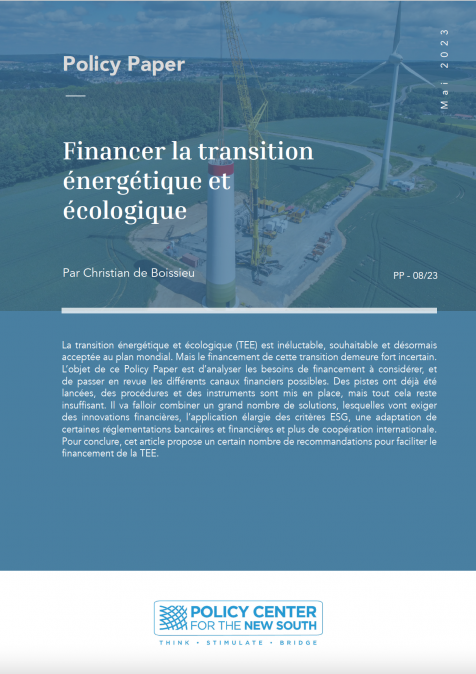مع تزايد التحديات البيئية وتفاقم تأثيرات التغير المناخي، بات التمويل المناخي ضرورةً ملحة لدفع التحول نحو اقتصاد منخفض الكربون ومستدام. فكيف يمكن توجيه الاستثمارات لتحقيق هذا الهدف؟ وما هي الأدوات المتاحة لدعم هذا التحول؟ تقدم لنا لوري هايتايان، مديرة معهد حوكمة الموارد الطبيعية للشرق الأوسط وشمال إفريقيا، وصابرين عمران، باحثة اقتصادية في مركز السياسات من أجل الجنوب الجديد، رؤى حول أهمية التمويل المناخي ودوره في بناء مستقبل أخضر لمنطقتنا
Speakers

Badr Mandri
Economist
Badr Mandri is an Economist who joined Policy Center for the New South after two years’ experience at the Moroccan national statistics office (HCP, High Commission for Planning). His research activities focus on development macroeconomics especially on fiscal policy and development financing. Badr Mandri holds a master’s degree in applied economics, and is currently a PhD student at Mohamed V University in Rabat;
...

Sabrine Emran
Senior Economist
Sabrine Emran is a Senior Economist at the Policy Center for the New South (PCNS).At the PCNS, Sabrine Emran conducts research on the Energy Transition, Climate Finance, and Critical Minerals, focusing on the energy priorities of developing countries in the context of sustainable development, just energy transition, and global climate commitments.Before joining the PCNS in 2022, Sabrine Emran worked as a Commodities Analyst and Risk Management Consultant, specializing in agricultural and energy commodities as well as foreign exchange risk. She also held a position at Lyxor Asset Management as Request for Proposal and Product Specialist, where she focused on alternative investment asset classes and collaborated closely with institutional investors.Sabrine Emran holds a master’s ...









